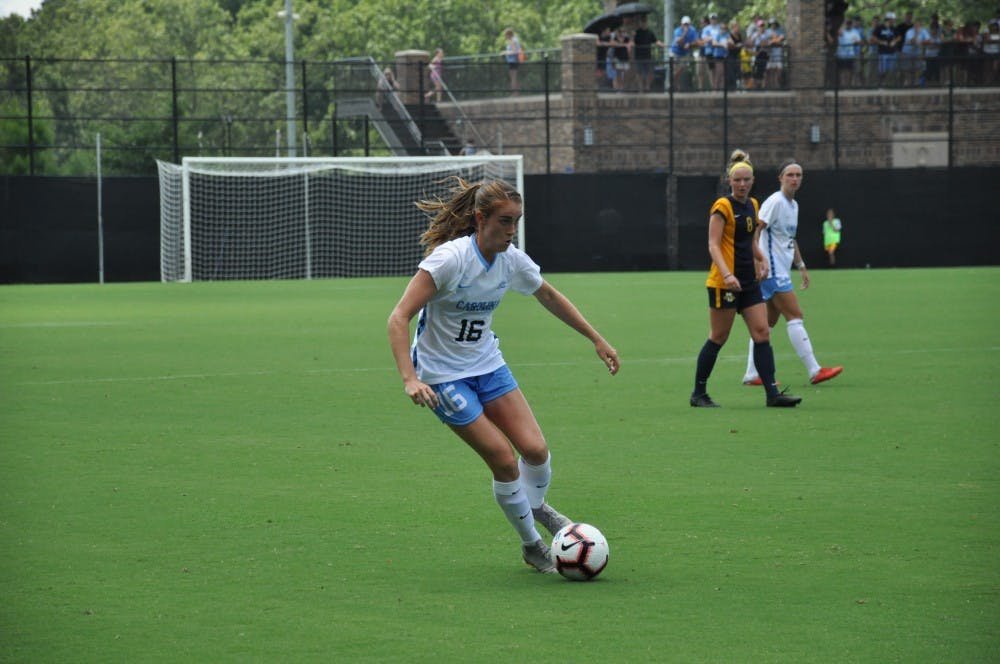In the Ashley family, there are athletes everywhere you turn. One of her sisters plays lacrosse at Bucknell University, and the other is looking at schools for track. Her dad was a competitive runner at Boston College. Her mom also a Boston College graduate and swam in school.
It’s important to know why the Ashleys are an atypical athletic family. Julia Ashley started showing an interest in sports at 3 years old. Instead of pushing her into one sport, her parents let her play around with several.
“You hear these radical stories sometimes with these parents that are pushing their kids into single sports and doing all these sorts of things,” said Martin Ashley, Julia's dad. “With Julia, you actually had to do the opposite, you had to pull her back. She was just so competitive.”
Perhaps the story that best sums up her competitive fire was during a summer league basketball game as an 11-year-old with several members of the local high school junior varsity team. She scored 14 points against players three years her senior.
The High School
Ashley was a three-sport athlete in middle school, but picked soccer over lacrosse and basketball around the time of eighth grade after she realized the time commitment required for all three.
She played on two soccer teams her first year — her varsity high school team and the club team she had played on since she was 7 years old, Match Fit Academy.
That wouldn’t last though.
She stopped playing for Verona High School after suffering injuries on the field. It’s a choice her club coach, Raper, respected.
“She’s the best player in her town; she’s the best player in high school as a freshman, playing against girls that are two years older,” Raper said. “They just spent the entire game kicking her around the field.”
For Julia Ashley, it was like a boxing match.
The Knee
To get the day's news and headlines in your inbox each morning, sign up for our email newsletters.
Ashley looks out for her body. She said that “[her] body is a temple” with a grin, but it’s clear that she meant it. Anyone who has ever met her could tell that she meant it.
It’s why her injury was so upsetting at first.
“It was a fall practice,” Ashley said. “It was totally non-contact. I just went to turn one way, and then cut the other, and my whole knee just gave out.”
She had torn her ACL, MCL and her meniscus. Ashley couldn’t believe it — literally. She tried to convince herself she hadn’t torn it after Raper informed her what he suspected happened.
“At that point a lot of girls before me on my team had been tearing their ACLs,” Julia said. “They were like, ‘Oh it doesn’t hurt’ and I thought ‘Alright, that hurts so bad, so maybe I didn’t do it’.”
It would be 6 months before she could retake the field, and around a year before she was playing full contact. It would take even longer for Ashley feel like herself — about a year and a half.
In the meantime, she had work to do: physical therapy three times a week in Montclair, N.J., the next town over. She wasn’t alone during the process. Her friend Kelly Ann Livingstone, now on the Georgetown University's women’s soccer team, tore her ACL about a week after Ashley's accident. They went through physical therapy together.
They made it a competition.
“We were kind of competing with each other throughout our entire rehab process,” Ashley said. “Who had more flexion, what degree, how far. You have to get your heel all the way to your butt, so we were trying to do that.”
The early days were frustrating for Ashley, unable to do movements she once considered routine. There were breakdowns and minor setbacks when she tried to push herself too hard.
An injury like that is always hard. The fact that Ashley came back from it is what’s impressive.
As her father said, “Anybody can get surgery. It’s what you do afterwards.”
The Comeback
Watching her now, it’s difficult to tell she ever lacked the ability to run, much less walk. It’s a testament to her work ethic. Just ask her current coach Anson Dorrance.
“She’s one of the fittest players I’ve ever coached in my life,” Dorrance said. “And I’m including the full national team that I coached for 8 years that won a world championship in ‘91.”
She’s been a four-year starter for the winning collegiate women’s soccer program. She’s been named captain twice.
“Her vocal leadership is extraordinary,” said her former teammate Kate Morris. “I’ve seen her countless times have the difficult conversations with players that needed to be had, and she doesn’t have the fear to say how it is.”
Those difficult conversations are just another product of her drive. It’s why Dorrance respects her. It’s why everyone does.
“I think a problem with a lot of girls, especially in girls sports," Ashley said. "We’re all afraid we’re going to step on each other’s toes or hurt each other’s feelings."
Not being afraid to push the woman next to you is something Dorrance preaches constantly. It’s something one of her best friends and former teammate, Frances Reuland, remembers about Ashley.
“We were doing this track workout, and of course [Julia] is probably lapping me,” Reuland said.
Reuland described Dorrance coming out on a balcony outside his office to watch the athlete's after hours workout. After they finished, Reuland checked her phone and saw a message from her coach, wishing that she didn’t have a post-workout heart attack.
Throughout her career, Ashley has always motivated her teammates like she motivated Reuland that day. She's the type of teammate that runs with you. She's one that pushes you. Because Ashley is going to be running. And she’s not going to stop until the rest of her team is running with her.
@bg_keyes
@DTHSports | sports@dailytarheel.com



